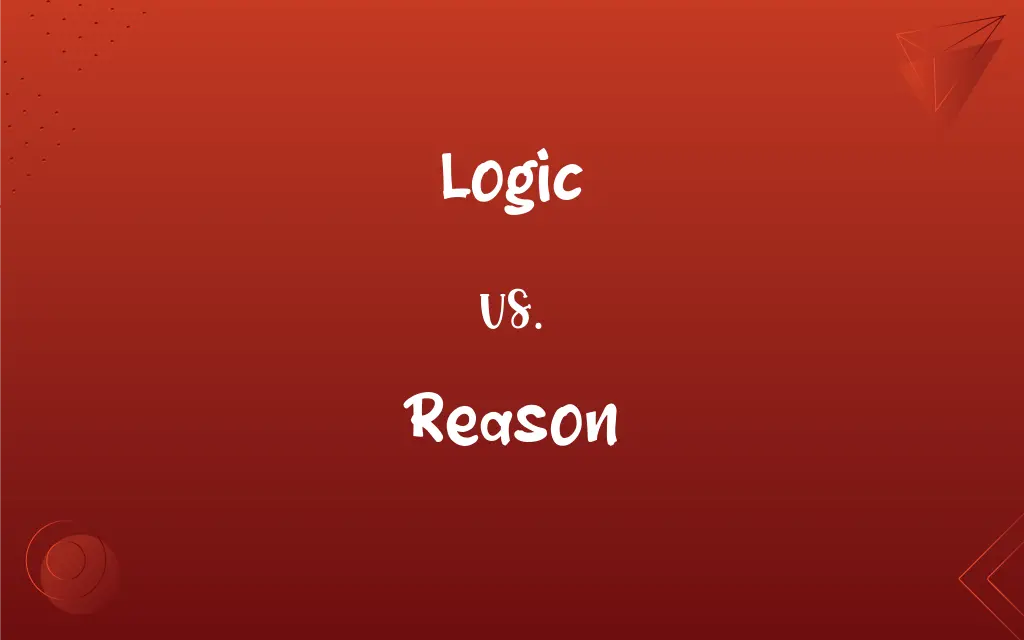Logic vs. Reason: What's the Difference?
Edited by Harlon Moss || By Janet White || Published on January 18, 2024
Logic is a system of reasoning to assess the validity of statements. Reason is the capacity for rational thought, explanation, or justification.

Key Differences
Logic refers to a structured method of reasoning that follows strict principles and rules, often used in mathematics and philosophy to derive conclusions from premises. Reason, in contrast, is the mental capacity to think, understand, and form judgments by a process of logic.
Logic is often seen as a formal system for evaluating the validity of arguments, focusing on the form rather than the content. Reason encompasses the broader process of thinking and rationalizing, including the ability to apply common sense and understanding to problems.
In philosophy, logic is a discipline that studies the standards and criteria for good reasoning. Reason is often considered the fundamental means by which humans make sense of the world, involving cognitive processes like analysis and interpretation.
Logic is used to construct arguments, identify fallacies, and deduce truths, operating within defined parameters. Reason is more subjective, involving personal judgment and the ability to consider various viewpoints and explanations.
Logic can be symbolic or mathematical, representing abstract structures of reasoning. Reason can be influenced by emotions and personal beliefs, reflecting a more holistic understanding of human thought processes.
ADVERTISEMENT
Comparison Chart
Definition
Systematic method of reasoning
Mental capacity for rational thought
Focus
Validity of arguments
Process of thinking and understanding
Application
Formal argumentation, fallacy identification
Making sense of the world, decision-making
Subjectivity
Objective and structured
Can be influenced by emotions, beliefs
Discipline
Often associated with mathematics, philosophy
Broadly used in various contexts
ADVERTISEMENT
Logic and Reason Definitions
Logic
The science of correct reasoning.
Using logic, she could prove her argument was valid.
Reason
Justification for a belief or action.
She had good reason to believe her hypothesis was correct.
Logic
The study of formal structures of reasoning.
In mathematics, logic forms the basis of proofs.
Reason
The power of the mind to think, understand, and form judgments.
She used reason to solve the ethical dilemma.
Logic
The method of human thought that involves reasoning.
Her logic was impeccable in solving the complex problem.
Reason
Rational thinking or argument.
Their decision was based on sound reason.
Logic
A system of principles for evaluating arguments.
Logic helped him identify the fallacies in the debate.
Reason
The ability to think and draw conclusions in a logical way.
His reason led him to a different conclusion.
Logic
The rules governing the validity of propositions and inferences.
He applied logic to deduce the correct answer from the given facts.
Reason
A cause or explanation for an action or event.
The reason for the power outage was a fallen tree.
Logic
The study of principles of reasoning, especially of the structure of propositions as distinguished from their content, and of method and validity in deductive reasoning.
Reason
The basis or motive for an action, decision, or conviction
There are good reasons to learn a foreign language. See Usage Notes at because, why.
Logic
A system of reasoning
Aristotle's logic.
FAQs
Can reason be influenced by emotions?
Yes, reason can be influenced by emotions and personal beliefs.
Is logic always rational?
Yes, logic is inherently rational as it follows strict rules of reasoning.
What is logic?
A systematic method of reasoning and argument evaluation.
What is reason?
The mental ability to think, understand, and form judgments.
Can reason be flawed?
Yes, if based on incorrect information or biases.
What is symbolic logic?
A form of logic using symbols to represent logical forms.
Is reason always logical?
Not necessarily, as reason can involve subjective judgments.
Can logic be applied in everyday life?
Yes, in problem-solving and decision-making processes.
Is logic taught in schools?
Often, particularly in subjects like math and philosophy.
Can reason lead to different conclusions?
Yes, as it can be influenced by different perspectives and information.
How does logic differ from reason?
Logic is more structured, while reason is broader and can include subjective elements.
Do all logical arguments make sense?
They make sense within their logical structure, but their premises may not always be true.
How is reason used in decision making?
By applying rational thought and judgment to evaluate options.
What role does logic play in mathematics?
It's fundamental in forming proofs and solving equations.
How do emotions affect reason?
They can alter perceptions and judgments, impacting conclusions.
Is reason important in science?
Yes, for hypothesis formulation and interpreting data.
How can logic improve reasoning?
By providing a structured framework for evaluating arguments and conclusions.
Is logic the same as common sense?
Not exactly; logic is more formal, while common sense is more intuitive.
Can everyone reason effectively?
Varies based on individual cognitive abilities and knowledge.
Are there different types of logic?
Yes, including formal, informal, symbolic, and mathematical logic.
About Author
Written by
Janet WhiteJanet White has been an esteemed writer and blogger for Difference Wiki. Holding a Master's degree in Science and Medical Journalism from the prestigious Boston University, she has consistently demonstrated her expertise and passion for her field. When she's not immersed in her work, Janet relishes her time exercising, delving into a good book, and cherishing moments with friends and family.
Edited by
Harlon MossHarlon is a seasoned quality moderator and accomplished content writer for Difference Wiki. An alumnus of the prestigious University of California, he earned his degree in Computer Science. Leveraging his academic background, Harlon brings a meticulous and informed perspective to his work, ensuring content accuracy and excellence.































































